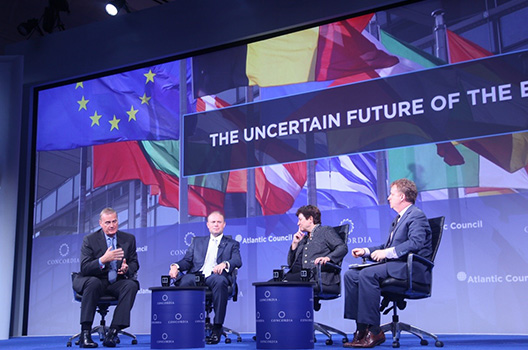 On September 20, the Atlantic Council held a public plenary session on the uncertain future of the European Union (EU) at the 2016 Concordia Summit in New York City on the margins of the United Nations General Assembly. Mr. Frederick Kempe, president and CEO of the Atlantic Council, kicked off the session with remarks on the enormous strategic stake that the United States has in Europe’s future and how transatlantic alliances and values reinforce a strong and stable Europe.
On September 20, the Atlantic Council held a public plenary session on the uncertain future of the European Union (EU) at the 2016 Concordia Summit in New York City on the margins of the United Nations General Assembly. Mr. Frederick Kempe, president and CEO of the Atlantic Council, kicked off the session with remarks on the enormous strategic stake that the United States has in Europe’s future and how transatlantic alliances and values reinforce a strong and stable Europe.
Following Mr. Kempe’s remarks, Mr. Geoff Dyer, reporter of the Financial Times, moderated a conversation on the EU’s future with some of the key leaders helping to chart Europe’s course. The esteemed panelists included H.E. Kristalina Georgieva, vice-president for budget and human resources of the European Union Commission; H.E. Joseph Muscat, prime minister of the republic of Malta; and General James L. Jones, Jr., chairman of the Atlantic Council’s Brent Scowcroft Center on International Security, former national security advisor to the US president and former commander of US European Command and Supreme Allied Commander Europe.
The panelists exchanged in a frank dialogue on the challenges facing Europe while focusing on constructive solutions, avenues for progress, and optimism around European ideals. Mr. Dyer questioned the panelists on the links between the refugee and financial crises with the cross-cutting challenge of political legitimacy, particularly in light of the Brexit vote and widespread anti-establishment and populist sentiment. Vice-President Georgieva argued that the EU should have built greater ties with the United Kingdom (UK) earlier and that now, more than ever, it must focus on the values that unite the EU and the UK as the two will remain European neighbors. She asserted that the EU’s strength lies in its unified market and competitiveness, while its greatest challenge centers around a crisis of confidence rather than the headline issues of migration and economic stagnation.
President Muscat proposed that the UK exit need not be overly painful, but that the result needs to be inferior to EU membership. At a time of historic change across the EU, he underscored a fundamental point that Europe does not and should hold the same meaning to each member state and EU citizen. General Jones declared that Europe is the most essential alliance to the United States, and that to achieve prosperity together as a transatlantic community, it is imperative to apply the pillars of security, economic development, and governance and rule of law to threats on both sides of the Atlantic. He emphasized that United States should continue to play a proactive and engaged role in the future of Europe through the EU and NATO.
Image: General James L. Jones, Jr., chairman of the Atlantic Council’s Brent Scowcroft Center on International Security (left), H.E. Joseph Muscat, prime minister of the republic of Malta (center left), H.E. Kristalina Georgieva, vice-president for budget and human resources of the European Union Commission (center right), and Mr. Geoff Dyer, reporter of the Financial Times (right), engage in a conversation on the uncertain future of the European Union at a public plenary session organized by the Atlantic Council at the 2016 Concordia Summit.

